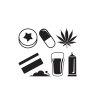Shisha and Hookah: Your Questions Answered
What is shisha?
Shisha is a way of smoking that uses a water pipe. It is also called hookah, hubble-bubble, or narghile.
Shisha usually contains flavoured tobacco mixed with molasses or honey, giving it a sweet taste and helping it burn longer.
You can also buy tobacco-free or nicotine-free versions. These may come as paste or gel.
How does a shisha pipe work?
The tobacco or paste is heated with charcoal. When you breathe in through the pipe, the smoke passes through a bowl of water. This cools the smoke before you inhale it.
Is shisha a drug?
Shisha itself is not a drug—it is a way of smoking. But most shisha uses tobacco, which contains nicotine.
Nicotine is a drug. It affects your body and brain. It can make you feel more alert or relaxed, but it is addictive, meaning it can be hard to stop once you start.
When you smoke shisha with tobacco, you breathe in nicotine and other chemicals. Even though the smoke goes through water, the nicotine still gets into your body.
Some shisha is nicotine-free. This doesn’t have tobacco, but the smoke can still contain harmful chemicals from the charcoal and flavourings.
In short:
- Shisha is how you smoke—it’s not a drug itself.
- Most shisha contains tobacco with nicotine (a drug).
- Nicotine is addictive.
- Even nicotine-free shisha can still produce harmful smoke.
Find out more on our Is Shisha a Drug? page
Does shisha have nicotine?
Most shisha tobacco contains nicotine. This is the same addictive substance found in cigarettes.
Tobacco-free versions are available but may still produce harmful smoke when heated.
What is in shisha smoke?
Shisha smoke can contain:
- Nicotine (if tobacco is used)
- Carbon monoxide from the charcoal
- Tar and other chemicals
Even when water cools the smoke, it does not remove these substances.
How does shisha affect the body?
Shisha can make your heart rate and blood pressure go up.
Some people say it helps them feel relaxed or less anxious.
However, shisha smoke is often inhaled more deeply and for longer than cigarette smoke, meaning you take in more harmful substances.
What are the risks of smoking shisha?
- Feeling sick or dizzy, especially if you are not used to it
- Exposure to nicotine, carbon monoxide and other harmful chemicals
- Higher risk of cancers, heart disease, lung disease and circulatory problems with regular use
- Risk of spreading infections (like herpes, tuberculosis or hepatitis) if sharing a mouthpiece
Children and others nearby can also breathe in second-hand smoke, which can harm their health.
Is it safe to smoke shisha around my family and other people?
No, it is not safe. Second-hand smoke from shisha can harm everyone’s health and wellbeing.
Shisha smoke contains nicotine, carbon monoxide, and other harmful chemicals. Second-hand smoke stays in the air and can be breathed in by others.
Some people are at particular risk, including:
- Children and babies, whose lungs and bodies are still developing
- Pregnant people and their unborn babies
- Family members with asthma or other breathing problems
- Older adults or people with heart or lung conditions
There is no safe level of second-hand smoke. Smoking shisha indoors or in enclosed spaces can make the smoke build up, even if windows are open.
If you choose to smoke shisha, you can reduce harm to others by smoking outside, away from children, family members, and other people who do not want to breathe in smoke.
Is fruit-flavoured shisha safer?
No, fruit-flavoured shisha is not safer.
Fruit-flavoured or sweet-flavoured shisha still usually contains tobacco and nicotine. The flavours make it taste nicer, but they do not remove the harmful substances.
Smoking fruit-flavoured shisha produces the same carbon monoxide, tar, and other chemicals as regular shisha.
The sweet taste can make it easier to inhale more deeply or smoke for longer without noticing the harshness. This can increase how much harmful smoke you breathe in.
Even tobacco-free or nicotine-free flavoured products still produce harmful smoke when heated with charcoal.
In short: The flavour does not make shisha safe.
Is shisha safe during pregnancy?
No, it is not safe to use shisha during pregnancy. Shisha, also known as hookah, poses similar risks to smoking cigarettes and can harm both the pregnant person and the developing baby.
When you smoke shisha, you inhale substances like nicotine, carbon monoxide, and other harmful chemicals. These can cross the placenta and affect the baby’s development.
Risks of smoking shisha during pregnancy can include:
- Low birth weight
- Premature birth (baby born too early)
- Breathing problems for the baby
- Higher risk of stillbirth or miscarriage
Even tobacco-free or nicotine-free shisha can produce harmful smoke from the charcoal and flavourings.
It is beneficial to stop smoking at any point during pregnancy, as stopping can improve health outcomes for both you and your baby.
If you’re pregnant and want support to stop smoking, you can talk to a midwife, doctor, or a stop smoking service.
Is shisha illegal in the UK?
- It is legal to sell shisha products to adults over 18.
- It is illegal to sell tobacco or vaping products to anyone under 18.
- Smoking shisha is banned in enclosed public spaces, just like cigarettes.
Is shisha safer than cigarettes?
No, shisha is not safer than cigarettes.
A typical shisha session can expose you to more harmful substances than smoking a single cigarette. The cooler smoke feels smoother and less harsh, so people tend to inhale more deeply and for longer.
Can I reduce the risks if I choose to smoke shisha?
You can reduce harm by:
- Not sharing mouthpieces
- Choosing tobacco-free or nicotine-free products (though smoke can still be harmful)
- Limiting how often you smoke
- Avoiding smoking around children and others who do not want to breathe in smoke
- Ensuring good ventilation if smoking indoors
- Considering nicotine gum, patches, or e-cigarettes as alternatives
If your organisation supports people who need this information, you can order printed resources from our Shisha & Hookah resource page.
Want help to stop smoking?
If you want to cut down or stop smoking, free help and support is available:
- NHS Quit Smoking – Free tools, tips and local stop smoking services
- NHS Stop Smoking Services – Find free local support
- ASH (Action on Smoking and Health) – Information, support and resources to help you quit
You can also talk to your GP, pharmacist or local stop smoking service for free, confidential help and advice.


















